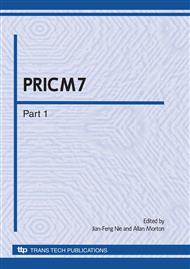p.2883
p.2887
p.2891
p.2895
p.2899
p.2903
p.2907
p.2911
p.2915
Resistance to Hydrogen Embrittlement and Behavior of Hydrogen in 6000 Series Aluminum Alloys
Abstract:
In recent years, the fossil fuel exhaustion and global warming have become serious problems. As a way to solve these problems, the development of the fuel cell vehicles has been paid attention to. In the fuel cell vehicles, high-pressure hydrogen gas is stored in a container consisting of aluminum liner and surrounding fiber-reinforced plastic layer. To increase the mileage per filling, an aluminum alloy having higher strength than the currently used 6061 alloy is needed. It has been known that increase in the Si content in 6000 series aluminum alloy brings about increase in the strength. In this study, a 6061 aluminum alloy with Si content of highest level (6061HS), 6061 alloy with a typical composition have been subjected to slow strain rate technique (SSRT) tensile tests in a moist air to assess the resistance to hydrogen embrittlement, and also to thermal desorption spectroscopy (TDS) to investigate the hydrogen behavior. The results obtained have been discussed in terms of the effect of Si content. Moreover, to investigate the effect of grain size, 6061HS alloy sheets with different grain size have been also subjected to the SSRT tensile tests and TDS.
Info:
Periodical:
Pages:
2899-2902
Citation:
Online since:
June 2010
Authors:
Keywords:
Price:
Сopyright:
© 2010 Trans Tech Publications Ltd. All Rights Reserved
Share:
Citation:


